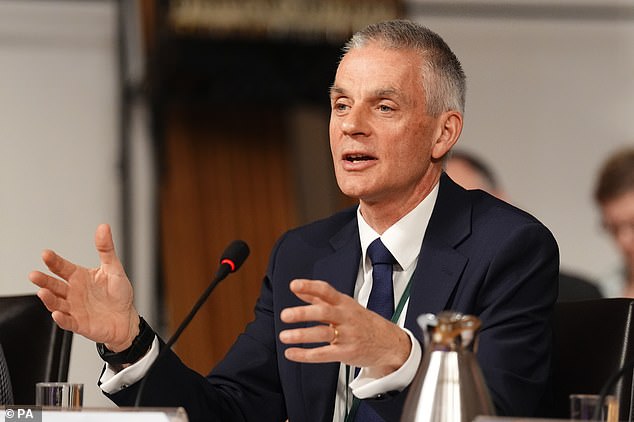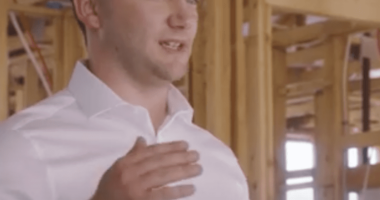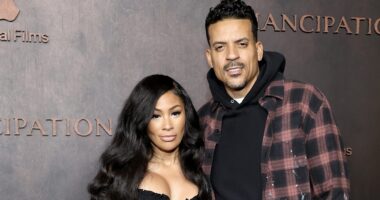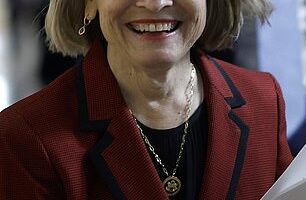The BBC’s director-general Tim Davie has resigned amid a row over the doctoring of a Donald Trump speech for a Panorama episode.
The corporation’s CEO of News, Deborah Turness, has also resigned following criticism that the BBC documentary misled viewers.
In a statement, Mr Davie said: ‘There have been some mistakes made and as director general I have to take ultimate responsibility.’
It comes after the scandal-hit broadcaster was this week plunged into a fresh crisis after an internal dossier exposed a string of incidents that demonstrate serious apparent bias in the Corporation’s reporting.
The concerns regard clips spliced together from sections of Mr Trump’s speech on January 6, 2021, to make it appear he told supporters he was going to walk to the US Capitol with them to ‘fight like hell’.
The documentary ‘Trump: A Second Chance?’ was broadcast by the BBC the week before last year’s US election.
Mr Trump described Mr Davie as ‘very dishonest’ and praised his departure.
In a post on his Truth Social platform, the US President wrote: ‘The top people in the BBC, including Tim Davie, the Boss, are all quitting/fired, because they were caught ‘doctoring’ my very good (perfect!) speech of January 6th.

The BBC’s director-general Tim Davie (pictured in January) has resigned amid a row over the doctoring of a Donald Trump speech for a Panorama episode.

Deborah Turness (pictured in October 2022), the CEO of News, has also resigned following criticism that the BBC documentary misled viewers
‘These are very dishonest people who tried to step on the scales of a Presidential Election. On top of everything else, they are from a Foreign Country, one that many consider our Number One Ally. What a terrible thing for Democracy!’
He also shared a Daily Mail column from Boris Johnson, where the former Prime Minister vowed to withhold his licence fee over the impartiality issue.
The White House had previously accused the BBC of ‘100 per cent fake news’.
Press secretary Karoline Leavitt said: ‘This purposefully dishonestly, selectively edited clip by the BBC is further evidence that they are total, 100 per cent fake news that should no longer be worth the time on the television screens of the great people of the United Kingdom.
Ms Leavitt posted a two-word response to Mr Davie’s resignation alongside two screenshots of news articles, one stating ‘Trump goes to war with ‘fake news’ BBC’, the other announcing his resignation.
She wrote ‘shot’ above the first article, adding ‘chaser’ above the second indicating the White House’s pleasure in how ‘the war’ they started panned out.
Ms Turness said the ‘buck stops with me’ and admitted the controversy had ’caused damage’ to the BBC.
But she denied claims that the BBC was institutionally biased.
‘The ongoing controversy around the Panorama on President Trump has reached a stage where it is causing damage to the BBC – an institution that I love,’ she said.
‘The buck stops with me.
‘While mistakes have been made, I want to be absolutely clear recent allegations that BBC News is institutionally biased are wrong.’

Mr Trump described Mr Davie as ‘very dishonest’ and praised his departure in a post on Truth Social

White House press secretary posted a two-word response to Mr Davie’s departure alongside two screenshots of news articles

Mr Trump also shared a Daily Mail column from Boris Johnson, where the former Prime Minister vowed to withhold his licence fee over the impartiality issue
Following the departures, Culture Secretary Lisa Nandy said: ‘I want to thank Tim Davie for his service to public broadcasting over many years.
‘He has led the BBC through a period of significant change and helped the organisation to grip the challenges it has faced in recent years.
‘Now more than ever, the need for trusted news and high quality programming is essential to our democratic and cultural life, and our place in the world.
‘As a government, we will support the Board as it manages this transition and ensure that the Charter Review is the catalyst that helps the BBC to adapt to this new era and secures its role at the heart of national life for decades to come.’
While Reform UK leader Nigel Farage said the resignations must be ‘the start of wholesale change’.
He said the government must appoint somebody with ‘a record of coming in and turning companies and their cultures around’.
‘This is the BBC’s last chance. If they don’t get this right, there will be vast numbers of people refusing to pay the licence fee,’ Farage added.
Conservative leader Kemi Badenoch said it was right that the pair resigned but claimed there have been a ‘catalogue of serious failures that runs far deeper’.
‘The Prescott report exposed institutional bias that cannot be swept away with two resignations – strong action must be taken on all the issues it raised,’ she said.
‘The culture at the BBC has not yet changed. BBC Arabic must be brought under urgent control. The BBC’s US and Middle East coverage needs a full overhaul.
‘And on basic matters of biology, the corporation can no longer allow its output to be shaped by a cabal of ideological activists.
‘The new leadership must now deliver genuine reform of the culture of the BBC, top to bottom – because it should not expect the public to keep funding it through a compulsory licence fee unless it can finally demonstrate true impartiality.’
The departures also follow a newsroom revolt after a newsreader who corrected ‘pregnant people’ to ‘women’ while live on air was rebuked.
The BBC has also faced fierce criticism for its coverage of the Israel-Gaza war and transgender rights.
While the dossier, written by former journalist Michael Prescott and sent to the BBC board, also raised serious concerns about BBC Arabic’s reporting on Gaza.
The corporation had already been under pressure after admitting to breaking editorial guidelines when Bob Vylan’s ‘deeply-offensive’ chant of ‘death to the IDF’ at Glastonbury was broadcast live to millions.
There was a nationwide backlash to the set, which saw Vylan lead the crowd in a chant of ‘death, death to the IDF’, as well as ‘from the river to the sea’, and used the term ‘f****** Zionists’.
The band’s frontman, real name Pascal Robinson-Foster, even claimed that BBC staff on the ground at the event told him that they ‘loved’ his set, and called it ‘fantastic’.
Mr Davie was forced to apologise to the Commons’ culture select committee, and told staff the broadcast was ‘deeply-offensive’ and ‘totally unacceptance’.
His tenure was also plagued by an antisemitism row involving Gary Lineker.
The former Match of the Day presenter was axed in May after 26 years following a row over an Instagram story he shared about Zionism which featured a rat – a vile antisemitic trope used by the Nazis to characterise Jews as vermin.
Lineker had previously come under fire after refusing to apologise for comparing the then Tory government’s rhetoric over its immigration policy to that of Nazi Germany.
The BBC also admitted its controversial documentary, Gaza: How To Survive A Warzone, breached its editorial guidelines by failing to disclose that the narrator was the son of a senior Hamas official.
Following his departure, Mr Davie said: ‘I wanted to let you know that I have decided to leave the BBC after 20 years. This is entirely my decision, and I remain very thankful to the Chair and Board for their unswerving and unanimous support throughout my entire tenure, including during recent days.
‘I am working through exact timings with the Board to allow for an orderly transition to a successor over the coming months.
‘I have been reflecting on the very intense personal and professional demands of managing this role over many years in these febrile times, combined with the fact that I want to give a successor time to help shape the Charter plans they will be delivering.
‘In these increasingly polarised times, the BBC is of unique value and speaks to the very best of us. It helps make the UK a special place; overwhelmingly kind, tolerant and curious. Like all public organisations, the BBC is not perfect, and we must always be open, transparent and accountable. While not being the only reason, the current debate around BBC News has understandably contributed to my decision.
‘Overall the BBC is delivering well, but there have been some mistakes made and as director-general I have to take ultimate responsibility.’

The BBC came under fire after it broadcast Bob Vylan’s ‘deeply-offensive’ chant of ‘death to the IDF’ at Glastonbury
BBC Chairman Samir Shah said it was a ‘sad day’ for the corporation.
‘Tim has been an outstanding director-general for the last five years. He has propelled the BBC forward with determination, single-mindedness and foresight.
‘He has had the full support of me and the Board throughout. However, I understand the continued pressure on him, personally and professionally, which has led him to take this decision today. The whole Board respects the decision and the reasons for it.
‘Tim has given 20 years of his life to the BBC. He is a devoted and inspirational leader and an absolute believer in the BBC and public service broadcasting. He has achieved a great deal. Foremost, under his tenure, the transformation of the BBC to meet the challenges in a world of unprecedented change and competition is well underway.
‘Personally, I will miss his stamina, good humour and resilience and I will miss working with him. I wish him and his family the very best for the future.
‘This is an important time for the Corporation and the Board and I will continue to work with Tim in the interim while we conduct the process to appoint his successor.’
The BBC has faced intense criticism in recent weeks over the balance of its coverage.
On Radio 4’s flagship Today programme, broadcaster Nick Robinson acknowledged that there was ‘a genuine concern about editorial standards and mistakes’ at the national broadcaster, but went on to say: ‘There is also a political campaign by people who want to destroy the organisation that you are currently listening to. Both things are happening at the same time.’
His remarks – later endorsed as ‘exactly right’ by veteran reporter John Simpson – were swiftly condemned as ‘ridiculous’ and ‘arrogant’ by former Prime Minister Boris Johnson, whose vow to withhold his licence fee over the impartiality issue sparked the outburst.
Reform MP Rupert Lowe said Mr Davie’s resignation was ‘good news’.
In a post on X, he wrote: ‘BBC director-general Tim Davie resigning – good news.
‘This is the start of the end for the BBC licence fee.
‘Make it a subscription service and let the British people decide if they wish to fund such woke insufferable guff.
‘I will certainly not be paying.’
Liberal Democrat leader Ed Davey said this ‘must be an opportunity for the BBC to turn a new leaf.’
He added: ‘The BBC isn’t perfect, but it remains one of the few institutions standing between our British values and a populist, Trump-style takeover of our politics.
‘As a public service broadcaster, the BBC’s role is vital in ensuring our democracy is based on facts, scrutiny, and accountability.’
The resignations comes after the BBC’s internal watchdogs censured newsreader Martine Croxall after she corrected the phrase ‘pregnant people’ to ‘women’ live on air.
Ms Croxall, 56, was introducing a segment on Britain’s heatwave in June when the autocue instructed her to report that ‘pregnant people’ should take precautions. After briefly reading the line, she corrected it with a raise of the eyebrow.

Mr Davie’s tenure was plagued by an antisemitism row involving Gary Lineker, who shared an antisemitic Instagram post featuring a rat – a vile antisemitic trope used by the Nazis to characterise Jews as vermin

The BBC also admitted its controversial documentary, Gaza: How To Survive A Warzone, breached its editorial guidelines by failing to disclose that the narrator was the son of a senior Hamas official
But in a ruling that has stunned other BBC journalists, the Corporation’s Executive Complaints Unit (ECU) last week found that Croxall breached impartiality rules, concluding that her facial expression gave a ‘strong impression of expressing a personal view on a controversial matter.
Sources say the censure is a ‘turning point’ for the BBC amid a growing rift between the newsroom and bosses.
Mr Davie, who became the director-general of the BBC in September 2020, was tasked with overseeing the broadcaster’s services as its editorial, operational and creative leader.
He also acted at the director-general between November 2012 and April 2013 and has stepped down after 20 years at the corporation.
Ms Turness became the CEO of BBC News in 2022 and was charged with running their news and current affairs programming.








